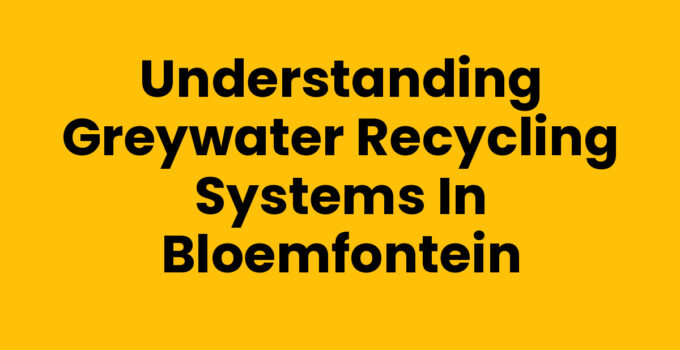Water scarcity is becoming a pressing issue in many parts of the world, and South Africa is no exception. In Bloemfontein, where the climate can be quite dry, efficient water management is crucial. One effective solution gaining traction is greywater recycling systems. In this comprehensive guide, we will explore what these systems are, their benefits, how to install them, and important maintenance tips.
Greywater Recycling Systems, Bloemfontein: A Step-by-Step Guide
Greywater refers to wastewater generated from household activities, excluding toilet waste. It includes water from showers, sinks, and washing machines. Greywater recycling systems reclaim this water for reuse, reducing the demand for fresh water. Here’s how you can set up and benefit from greywater recycling systems in Bloemfontein:
Step 1: Understand Local Regulations
Before installing a greywater system, familiarize yourself with local laws and regulations in Bloemfontein. Ensure your system complies with safety standards to avoid legal complications.
Step 2: Assess Water Usage
Analyze your household’s water usage patterns. Identify the sources of greywater, such as kitchens and bathrooms, and calculate how much greywater you can collect daily.
Step 3: Select the Right System
Choose a greywater system that suits your needs. Options include:
- Simple diverter systems: Redirect water from shower drains or sinks directly to the garden.
- Filtration systems: Clean and treat greywater before reusing it for irrigation.
- Mechanical systems: More complex setups that filter and store greywater for later use.
Step 4: Install Your System
Installation can vary based on the system selected. Basic systems can be DIY projects, while complex systems may require professional help. Ensure proper connections to the plumbing and drainage systems to avoid contaminants.
Step 5: Regular Maintenance
Maintain your greywater system to ensure optimal performance. Regular checks include:
- Cleaning filters to prevent clogging.
- Inspecting pipes for leaks or damage.
- Testing water quality to ensure it is safe for irrigation.
Benefits of Greywater Recycling Systems
Investing in greywater recycling systems in Bloemfontein comes with numerous benefits:
- Water Conservation: Reduces the demand for fresh water, especially in dry seasons.
- Cost Savings: Decreases water bills through reduced municipal water use.
- Environmental Impact: Decreases the volume of wastewater entering sewage systems, benefiting the local environment.
- Improved Garden Health: Provides nutrient-rich water to gardens, enhancing plant growth.
Important Considerations for Greywater Recycling
While greywater systems are beneficial, there are important considerations to keep in mind:
- Water Quality: Not all greywater is safe for all plants. Research suitable plants that can thrive on greywater.
- Health Risks: Ensure proper treatment and filtration to avoid potential health risks from pathogens.
- System Design: Design your system to be user-friendly; a complex setup might discourage usage.
In summary, greywater recycling systems in Bloemfontein present an innovative solution to water scarcity. By reclaiming water from household activities, residents can conserve precious resources, save money, and contribute positively to their environment. Consider researching and implementing a greywater system today!
Frequently Asked Questions
What is greywater and how is it different from blackwater?
Greywater is the water used in household activities like washing dishes, bathing, and laundry. Unlike blackwater, which contains sewage and toilet waste, greywater is less contaminated.
Can greywater be used for irrigation?
Yes, greywater can be reused for irrigation. However, it is essential to treat it properly to ensure safety for plants and humans.
What maintenance do greywater recycling systems require?
Greywater systems need regular cleaning of filters, inspection of pipes for leaks, and testing of water quality to ensure it remains safe for use.



